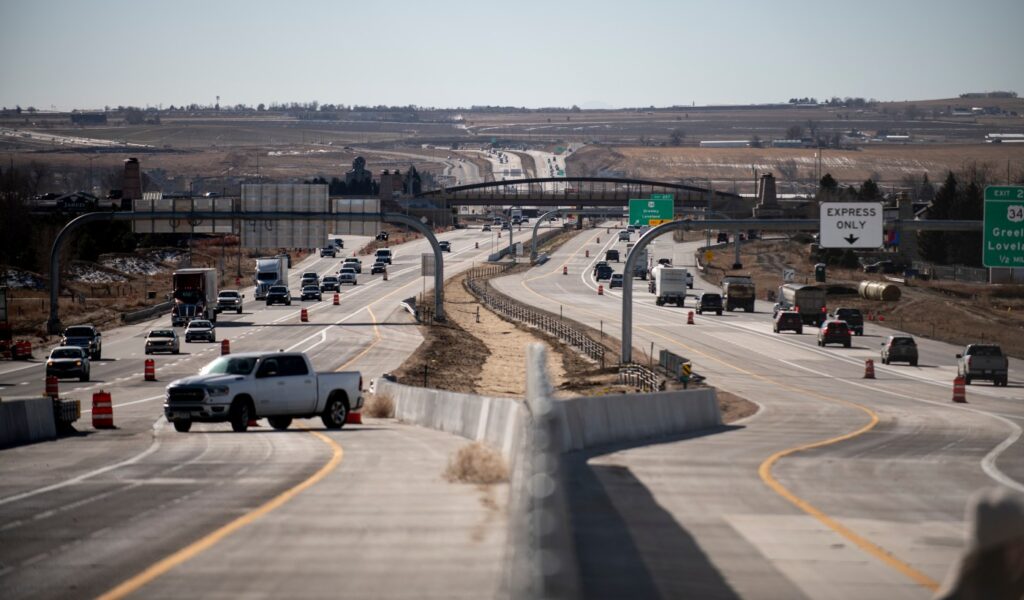LOVELAND – Colorado leaders drove north from Denver Thursday and celebrated the near-completion of a $1. 3 billion Interstate 25 expansion, hailing it as relief from traffic congestion for northern Front Range cities, amid looming uncertainty about how to ensure mobility in the future. The to add express toll lanes between Fort Collins and Berthoud includes a new kind of center-of-the-highway platform — Colorado Department of Transportation officials call it a “multimodal hub” — designed to reduce bus travel time.
But state transportation and political leaders, gathered by that hub, also acknowledged planning forecasts of worsening traffic congestion over the next 25 years. Colorado’s population is expected to grow by more than 1 million before 2050 and the latest study concluded total vehicle miles traveled will increase by 40%, leading to worse I-25 congestion by 2 p. m.
in 2050 than the current bumper-to-bumper I-25 traffic around 5 p. m. CDOT officials say simply widening roads will not prevent paralyzing jams.
Federal government officials, key players in securing transportation funding, concur. “We’re being overwhelmed by the growth,” the Federal Highway Administration’s Colorado Division director John Cater said, adding that an “all-of-the-above” approach including trains and more bicycles will be necessary. The I-25 Northern Express Lanes project, for now at least, addresses urgent needs for a reliable flow along I-25 by off-loading drivers who can afford to pay toll fees out of main lanes and onto express lanes.
The new express lanes are scheduled to open Dec. 15 with toll fees waived until 2024. This expansion also incentivizes car-pooling by giving free long-term access to express lanes for vehicles carrying three or more riders.
The central Bustang platform at Loveland — more of these are planned — lets bus drivers along the Denver-to-Fort Collins route pull out of express lanes without lumbering across non-express lanes to drop off and pick up passengers. CDOT officials said this will shave 10 minutes to 15 minutes off travel time between Fort Collins and Denver. A final phase of the northern I-25 expansion – widening a six-mile stretch between Mead and Berthoud, starting next spring – will mean at least three lanes along I-25 from Denver to Fort Collins.
That builds on the recent widening of I-25 south of Castle Rock, another project that incorporated express lanes. The expansions bring wider highway shoulders for emergency access as state safety officials increasingly raise safety concerns. Roadway fatalities in Colorado have increased from around 400 a year a decade ago to more than 760 last year, government records show.
Multiple new bridges installed along I-25 — the 35 completed so far include five overhauled interchanges — enabled the improvement of a 45-mile bicycling and walking trail along the Cache Le Poudre River, giving residents and wildlife better access to natural open space. I-25 now “is safer,” Gov. Jared Polis told a crowd of CDOT employees, contractors, and elected officials Thursday morning at a ribbon-cutting ceremony.
“It is more efficient. It saves people time getting to where they want to go. ” Polis cited the I-25 project as “a great example of how you can do lane expansion as well as multi-modal” that encourages bus riding and car-pooling.
“I don’t know what’s going to be happening in 2050,” Polis said in an interview. “But by then we’ll be working on Front Range Rail. ” A $500,000 federal grant awarded to Colorado this week is meant to spur planning for train travel along the I-25 corridor from Fort Collins to Pueblo.
The planning for a northern I-25 expansion began more than two decades ago. State and local governments initiated a required environmental impact study in 2001. At first, the project was scheduled to be done by 2035.
But rapid population growth in northern Colorado compelled faster action and a coalition of local and state officials, developers and lawmakers mobilized to compress timelines and get more work done. “Waiting just wouldn’t have worked. Traffic would have been grid-locked,” said Steve Adams, the city manager in Loveland, where the population of around 80,000 residents has increased by nearly 50% over the past two decades.
“We are looking forward to having this done,” Adams said of the I-25 expansion, adding that future mobility also will require a broadened approach. “We won’t be able to build enough roads to get out of the congestion. We will want to increase other modes.
That’s why this hub is so important,” he said. Last year, state transportation officials canceled a long-planned expansion of I-25 through often-clogged stretches in central Denver due to rising concerns about the environmental impacts of pollution from vehicles burning gas and diesel. That project depended on Colorado receiving federal transportation funding, and government agencies increasingly are prioritizing mass transit and other options that lead to less pollution.
“Widening freeways and adding express lanes can be a solution at times and mitigate some of the worst impacts,” said Robert Spotts, the manager of DRCOG’s mobility analytics program. “But we need to look at all congestion mitigation strategies. These include more people working from home.
We need to get people out of single-occupant vehicles, whether that means shifting them into transit or carpools. It is going to take all hands on deck, all forms of congestion mitigation, to reduce the worst impacts that are coming. ”.
From: denverpost
URL: https://www.denverpost.com/2023/12/07/i-25-new-express-lanes-fort-collins-traffic/
